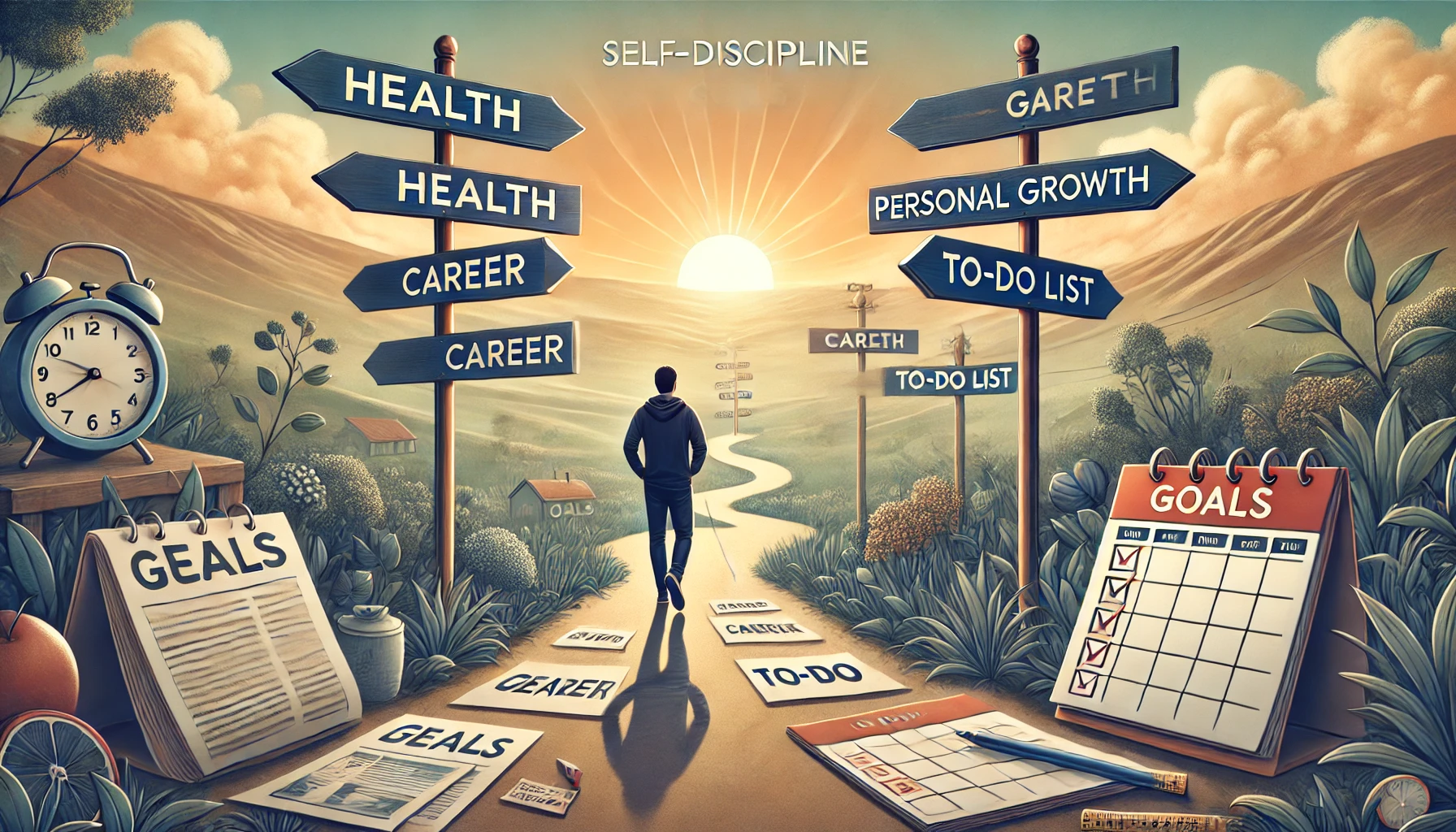How to Build Self-Discipline and Stick to Your Goals
Imagine achieving every goal you set, from adopting a healthier lifestyle to mastering a new skill. The secret ingredient? Self-discipline. In a world filled with distractions, learning how to build self-discipline and stick to your goals is crucial for success. Let’s dive into practical tips and strategies that will help you stay on track and turn your dreams into reality.
“Self-discipline is the bridge between goals defined and goals accomplished.” – Jim Rohn.
Understanding Self-Discipline
Self-discipline is the ability to control your impulses, emotions, and behaviors to achieve long-term goals. It’s about making choices that align with your values and aspirations, even when it’s tough. Think of self-discipline as a muscle; the more you exercise it, the stronger it becomes.
The Science Behind Self-Discipline
Research in psychology reveals that self-discipline is linked to the prefrontal cortex, the part of the brain responsible for planning and decision-making. This explains why developing self-discipline involves conscious effort and practice. Studies show that individuals with high self-discipline are more successful in various life domains, including academics, career, and personal relationships.
Setting Clear Goals
The first step in building self-discipline is to set clear, achievable goals. Your goals should be specific, measurable, attainable, relevant, and time-bound (SMART).
Specific Goals
Vague goals like “I want to get fit” are less effective than specific ones like “I want to lose 10 pounds in three months.” Specific goals give you a clear target to aim for.
Measurable Goals
Ensure your goals are measurable so you can track your progress. For instance, if your goal is to read more, decide how many books you want to read in a month.
Attainable Goals
While it’s great to aim high, make sure your goals are realistic. Setting unattainable goals can lead to frustration and decreased motivation.
Relevant Goals
Your goals should align with your values and long-term aspirations. This relevance will keep you motivated and committed.
Time-Bound Goals
Set a deadline for your goals to create a sense of urgency. Deadlines help prevent procrastination and keep you focused.
Building Self-Discipline
Now that your goals are set, let’s explore strategies to build self-discipline and stay committed.
Develop a Routine
Creating a daily routine helps establish good habits and reduces decision fatigue. When certain tasks become part of your routine, they require less mental effort to complete. Start your day with a productive morning routine to set a positive tone.
[Related: Creating a Productive Morning Routine: Tips and Tricks]
Break Down Tasks
Large tasks can be overwhelming and lead to procrastination. Break down your goals into smaller, manageable tasks. This approach makes it easier to stay focused and track your progress.
Prioritize Tasks
Not all tasks are created equal. Prioritize tasks based on their importance and urgency. Tackle high-priority tasks first to ensure you’re making significant progress towards your goals.
Eliminate Distractions
Identify and eliminate distractions that hinder your productivity. This might mean turning off notifications, creating a designated workspace, or setting specific times for checking emails and social media.
Practice Mindfulness
Mindfulness helps you stay present and focused. Incorporate mindfulness practices like meditation or deep breathing exercises into your routine to improve concentration and self-control.
Staying Motivated
Maintaining motivation is crucial for sticking to your goals. Here are some strategies to keep your motivation levels high.
Visualize Success
Visualization is a powerful tool for motivation. Imagine yourself achieving your goals and enjoying the benefits. This positive imagery can boost your determination and drive.
Reward Yourself
Set up a reward system to celebrate your achievements, no matter how small. Rewards can be a powerful motivator and reinforce positive behavior.
Stay Accountable
Share your goals with friends, family, or a mentor who can hold you accountable. Regular check-ins and progress updates can keep you motivated and committed.
Reflect on Progress
Regularly review your progress and adjust your strategies as needed. Reflecting on your achievements and setbacks helps you stay on track and make necessary improvements.
Overcoming Challenges
Building self-discipline and sticking to your goals is not always smooth sailing. Here’s how to navigate common challenges.
Managing Setbacks
Setbacks are a natural part of any journey. Instead of getting discouraged, view them as learning opportunities. Analyze what went wrong, adjust your approach, and move forward.
Dealing with Temptations
Temptations can derail your progress. Develop strategies to manage temptations, such as avoiding triggers, practicing self-control techniques, and seeking support when needed.
Maintaining Consistency
Consistency is key to building self-discipline. Even on days when motivation is low, stick to your routine. Consistent effort, even small, leads to significant progress over time.
The Role of Willpower
Willpower plays a crucial role in self-discipline. It’s the inner strength that helps you resist short-term temptations in favor of long-term goals.
Strengthening Willpower
Just like self-discipline, willpower can be strengthened with practice. Start with small challenges and gradually increase the difficulty. For instance, if you’re trying to reduce screen time, start with a 30-minute reduction per day and gradually increase it.
Managing Willpower Fatigue
Willpower is a finite resource that can get depleted. To manage willpower fatigue, take breaks, practice self-care, and ensure you get adequate sleep and nutrition.
Creating a Supportive Environment
Your environment plays a significant role in building self-discipline. Create a space that supports your goals and minimizes distractions.
Declutter Your Space
A cluttered environment can lead to a cluttered mind. Keep your workspace organized and free of unnecessary items.
Surround Yourself with Positivity
Surround yourself with people who inspire and motivate you. Positive influences can boost your determination and help you stay focused on your goals.
Use Technology Wisely
Leverage technology to support your goals. Use productivity apps, reminders, and tools to stay organized and on track.
Developing a Growth Mindset
A growth mindset, the belief that abilities can be developed through dedication and hard work, is essential for building self-discipline.
Embrace Challenges
View challenges as opportunities to grow rather than obstacles. Embracing challenges helps you develop resilience and perseverance.
Learn from Criticism
Constructive criticism provides valuable insights for improvement. Instead of taking it personally, use feedback to refine your strategies and enhance your skills.
Celebrate Effort
Focus on the effort you put into your goals rather than just the outcomes. Celebrating effort fosters a growth mindset and encourages continuous improvement.
Conclusion
Building self-discipline and sticking to your goals is a journey that requires effort, patience, and persistence. By setting clear goals, developing effective strategies, and maintaining motivation, you can cultivate the self-discipline needed to achieve your dreams.
Remember, setbacks are part of the process. Learn from them, adjust your approach, and keep moving forward. With determination and resilience, you can build the self-discipline necessary to turn your aspirations into reality.
Ready to take the next step? Explore more about achieving your goals and staying motivated by reading our related articles:
- Achieving Your Goals: Practical Steps to Stay Motivated
- The Science of Motivation: Understanding What Drives Us
- Creating a Productive Morning Routine: Tips and Tricks
Stay disciplined, stay focused, and watch your goals transform into achievements.







